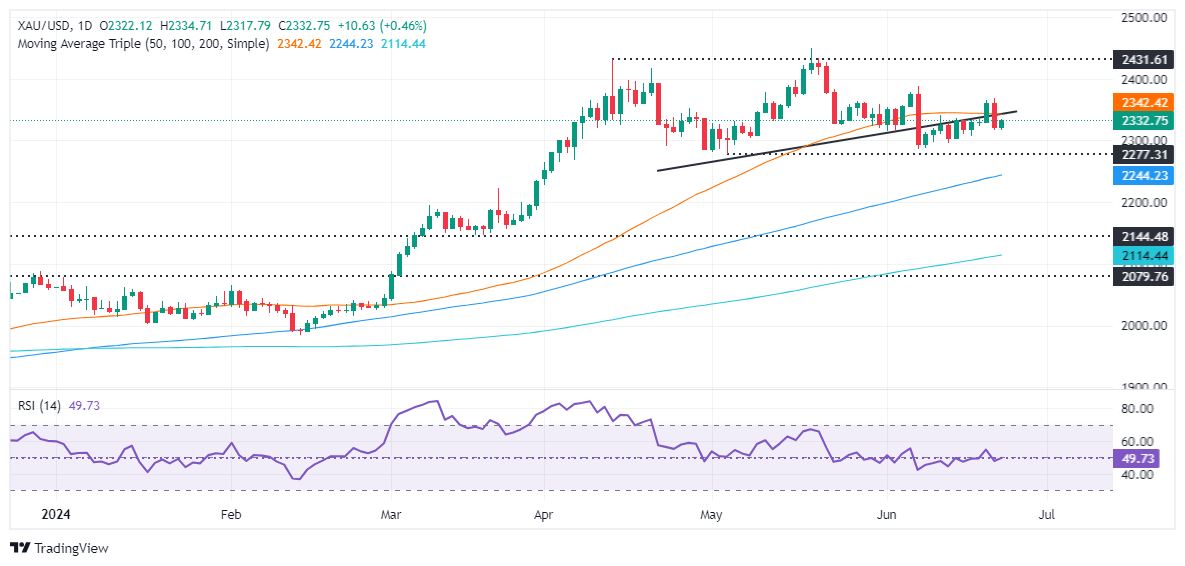- Gold benefits from a weaker US Dollar, and edges up 0.45%, amid firm US Treasury bond yields.
- Investors eye the upcoming PCE Price Index, the Fed’s preferred inflation measure, which could impact rate cut expectations.
- The US Dollar Index (DXY) falls as the CME FedWatch Tool indicates a 66% chance of a rate cut in September, up from 59.5%.
Gold jumped off last Friday’s low and benefitted from a weaker US Dollar on Monday. On Friday, investors are bracing for the release of the Federal Reserve’s preferred gauge for inflation, the Personal Consumption Expenditures (PCE) Price Index. XAU/USD trades at $2,332, up 0.49%, while the Greenback falls amid firm US Treasury bond yields.
Risk appetite deteriorated; investors seeking safety flock to the golden metal. US Treasury bond yields are flat, as depicted by the 10-year Treasury note standing at 4.253% unchanged.
The US Dollar Index (DXY), which tracks the value of American currency against a basket of six other currencies, fell 0.26% to 105.53.
The US economic docket will feature the Fed’s preferred gauge for inflation, the PCE. If the data aligns with the consensus, this will mean that the disinflation process is evolving as Fed policymakers expect and increase the chances for an interest rate cut as soon as September.
According to the CME FedWatch Tool, traders are pricing in a 66% chance of easing in September, up from 59.5%.
In the meantime, San Francisco Fed President Mary Daly said the labor market is ‘nearing” an inflection point, where further weakening will signify higher unemployment. Daly’s comments signal she’s leaning dovish as she added, “At this point, inflation is not the only risk we face.”
The December 2024 federal funds rate futures contract implies the Fed will ease policy by just 36 basis points (bps) toward the end of the year.
Daily digest market movers: Gold price advances on a soft US Dollar
- Headline PCE is expected to hit 0% in May, lower than April’s 0.3%, and in the twelve months to May, to edge lower from 2.7% to 2.6%.
- Core PCE is foreseen at 0.1% MoM, down from 0.2%, and on an annual basis, is estimated to dip from 2.8% to 2.6%.
- Last week’s US economic data was mixed. On the growth side, the economy remains robust via strong S&P Global Flash PMIs and a slowdown in Retail Sales. Nevertheless, it shows some weakness on the labor market side.
- Fed officials advised patience regarding interest rate cuts, emphasizing that their decisions would remain data dependent. Despite last week's positive CPI report, policymakers reiterated the need to see more data like May's before considering any changes.
Technical analysis: Gold price climbs and test Head-and-Shoulders neckline at around $2,330
Gold price remains downward biased after forming a ‘bearish-engulfing’ chart pattern on Friday. This further validates the Head-and-Shoulders chart pattern, meaning that further downside is expected for the non-yielding metal
The XAU/USD next support would be $2,300. Once cleared, XAU/USD would fall to $2,277, the May 3 low, followed by the March 21 high of $2,222. Further losses lie underneath, with sellers eyeing the Head-and-Shoulders chart pattern objective from $2,170 to $2,160.
Conversely, if Gold reclaims $2,350, that will expose additional key resistance levels like the June 7 cycle high of $2,387, ahead of challenging the $2,400 figure.
Economic Indicator
Personal Consumption Expenditures - Price Index (MoM)
The Personal Consumption Expenditures (PCE), released by the US Bureau of Economic Analysis on a monthly basis, measures the changes in the prices of goods and services purchased by consumers in the United States (US).. The MoM figure compares prices in the reference month to the previous month. Price changes may cause consumers to switch from buying one good to another and the PCE Deflator can account for such substitutions. This makes it the preferred measure of inflation for the Federal Reserve. Generally speaking, a high reading is bullish for the US Dollar (USD), while a low reading is bearish.
Read more.Next release: Fri Jun 28, 2024 12:30
Frequency: Monthly
Consensus: 0%
Previous: 0.3%
Source: US Bureau of Economic Analysis
Information on these pages contains forward-looking statements that involve risks and uncertainties. Markets and instruments profiled on this page are for informational purposes only and should not in any way come across as a recommendation to buy or sell in these assets. You should do your own thorough research before making any investment decisions. FXStreet does not in any way guarantee that this information is free from mistakes, errors, or material misstatements. It also does not guarantee that this information is of a timely nature. Investing in Open Markets involves a great deal of risk, including the loss of all or a portion of your investment, as well as emotional distress. All risks, losses and costs associated with investing, including total loss of principal, are your responsibility. The views and opinions expressed in this article are those of the authors and do not necessarily reflect the official policy or position of FXStreet nor its advertisers. The author will not be held responsible for information that is found at the end of links posted on this page.
If not otherwise explicitly mentioned in the body of the article, at the time of writing, the author has no position in any stock mentioned in this article and no business relationship with any company mentioned. The author has not received compensation for writing this article, other than from FXStreet.
FXStreet and the author do not provide personalized recommendations. The author makes no representations as to the accuracy, completeness, or suitability of this information. FXStreet and the author will not be liable for any errors, omissions or any losses, injuries or damages arising from this information and its display or use. Errors and omissions excepted.
The author and FXStreet are not registered investment advisors and nothing in this article is intended to be investment advice.
Recommended content
Editors’ Picks

AUD/USD clings to recovery gains above 0.6200, focus shifts to US ISM PMI
AUD/USD sustains the recovery from two-year troughs, holding above 0.6200 in Friday's Asian trading. The pair finds footing amid a pause in the US Dollar advance but the upside appears elusive as markets turn cautious amid China concerns and ahead of US ISM PMI data.

USD/JPY eases toward 157.00 as risk sentiment sours
USD/JPY is extending pullback from multi-month high of 158.07 set on Thursday. The pair drops toward 157.00 in the Asian session on Friday, courtesy of the negative shift in risk sentiment. Markets remain concerned about China's econmic health and the upcoming policies by the Fed and the BoJ.

Gold price holds ground due to safe-haven demand amid rising tensions in Middle East
Gold price edges higher for the fourth consecutive session on Friday, building on a stellar performance in 2024 with gains exceeding 27%, the metal’s best annual return since 2010. This sustained rally is attributed to strong safe-haven demand amid persistent geopolitical tensions in the Middle East and the prolonged Russia-Ukraine conflict.

Could XRP surge to new highs in January 2025? First two days of trading suggest an upside bias
Ripple's XRP is up 7% on Thursday, extending its rally that began during the New Year's Day celebration. If long-term holders continue their recent accumulation, XRP could overcome the $2.9 resistance level and aim for a new all-time high.

Three Fundamentals: Year-end flows, Jobless Claims and ISM Manufacturing PMI stand out Premium
Money managers may adjust their portfolios ahead of the year-end. Weekly US Jobless Claims serve as the first meaningful release in 2025. The ISM Manufacturing PMI provides an initial indication ahead of Nonfarm Payrolls.

Best Forex Brokers with Low Spreads
VERIFIED Low spreads are crucial for reducing trading costs. Explore top Forex brokers offering competitive spreads and high leverage. Compare options for EUR/USD, GBP/USD, USD/JPY, and Gold.
